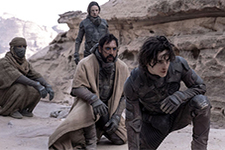Dune (2021)
|  Frank Herbert’s Dune, which was originally serialized in the science fiction magazine Analog between December 1963 and May 1965 before being published as a complete novel in 1965, has long been considered one of the cornerstones of modern science fiction literature, which accounts for why there have been so many attempts to translate it to the screen despite its being widely considered “unfilmable.” That “unfilmable” status, of course, is part of its allure, offering up the ineffable of challenge of cinematically rendering Herbert’s dense prose, expansive narrative, and heavy themes about power, politics, and messianic religion set 20,000 years in the future. The Chilean-French provocateur Alejandro Jodoworsky was the first out of the gate in the early 1970s, envisioning a singularly bizarre spectacle that, had it ever made it out of development, would have featured a score by Pink Floyd and a starring role for the surrealist artist Salvador Dali. Ridley Scott, fresh off the success of Alien (1979), spent more than a year trying to bring it to fruition before abandoning it in favor of Blade Runner (1982), after which it was picked up by David Lynch at the behest of mega-producer Dino De Laurentiis. De Laurentiis got more than he bargained for, as Lynch’s innate weirdness and love of ambiguity ran headlong into the producer’s need for a viable commercial vehicle, and the result was a critical and commercial flop. Vestiges of Lynch’s grandly weird and perverse original vision remain scattered throughout the film, making it an experience that is both compelling and frustrating, an enigmatic provocation that melds wild art-film grotesquerie with post-Star Wars blockbuster ambitions. Sixteen years later, the Sci-Fi Channel produced a three-part miniseries in 2000 that was more faithful to Herbert’s novel and was considered a success, but the very fact that it gets so little mention attests to its ultimate lack of impact. And into this cinematic maw now ventures Denis Villeneuve, who is without doubt one of the most intriguing and compelling filmmakers working in the mainstream today. Although he first gained notice in Hollywood with the tense, violent crime-and-punishment dramas Prisoners (2014) and Sicario (2015), he has spent the past half decade working exclusively in the realm of heady science fiction (which has seen a significant resurgence at the box office), first with his elegant, emotionally rending alien encounter drama Arrival (2016) and then the long awaited sequel Blade Runner 2049 (2017). Villeneuve’s proficiency with both intimate human drama and large-scale spectacle makes him an ideal candidate to tackle Herbert’s epic, which he and co-screenwriters Jon Spaihts (Prometheus, Passengers) and Eric Roth (A Star is Born, Forrest Gump) have wisely split in half (a second Dune film has already been announced, thus ensuring that this one doesn’t suffer the fate of Ralph Bakshi’s 1978 animated version of The Lord of the Rings, which covered one and a half of Tolkien’s three books, but wasn’t successful enough to warrant a concluding film). The general beats of the story will be familiar to those who have seen Lynch’s version (full disclosure: I have seen Lynch’s film at least a dozen times over the years, have never seen the Sci-Fi Channel miniseries, and have not read any of Herbert’s Dune novels). Drawing on ancient epics and messianic religious myths, Dune’s story unfolds in an emperor-ruled universe structured around a feudal system in which planets are controlled by various royal families. There are two main rival “houses”—the Atreides and the Harkonnens—the latter of whom has been given the power to oversee the mining of the spice mélange, a special substance found only on the desert plant Arrakis, also known as Dune, where nary a drop of rain falls and the surface provides cover for giant, menacing sandworms the size of aircraft carriers. Spice is the most precious element in the universe because it expands the mind and allows for interstellar travel that would otherwise be impossible. Ruling over the two feuding houses is Padishah Emperor Shaddam IV, who, unlike in previous adaptations, is kept entirely off-screen here, which renders him a shadowy and unknowable figure. His primary machination is setting the Atreides and the Harkonnens directly against each other by allowing the Atreides to take over spice production while secretly helping Baron Vladimir Harkonnen (Stellan Skarsgård) and his nephew Raban (Dave Bautista) plot a surprise attack with the help of the Emperor’s army to destroy them. The Atreides are led by Duke Leto (Oscar Isaac), his concubine Jessica (Rebecca Ferguson), and their son Paul (Timothée Chalamet). Jessica is a member of the Bene Gesserit, a mystical female order that has been working for generations to produce the messianic figure known as Lisan al-Gaib, which may very well be Paul Atreides. While Lynch was much more fascinated by the vile Harkonnens, with their physical grotesquerie and leering ambitions, Villeneuve pays decidedly more attention to the Atreides, who he presents as models of humanity in a universe of cut-throat imperialism. Duke Leto’s treatment of Javier Bardem’s Stilgar, one of the leaders of the Fremen, the embattled native inhabitants of Arrakis, is telling of his fundamental decency (and the fact that the Fremen are cast almost entirely with people of color makes clear the film’s indebtedness to the realities of colonialism, past and present). The problem, however, is that the weight of the film’s various subplots and narrative machinations leave only minimal room for character development, which makes Dune quite different from both Arrival and Blade Runner 2049, both of which were as intriguing dramatically as they were visually. Villeneuve was smart to cast Chalamet as the would-be messiah-warrior, as his slight frame and narrow face remind us that he is, as Herbert envisioned him, a teenager struggling under multiple burdens of expectation and troubling dreams—namely the ones that prominently feature of a Fremen woman named Chani (Zendaya)—that he can’t decipher. However, Chalamet’s languid blankness often works against our investment in him, which leaves us with few options for emotional engagement. Interestingly, some of the peripheral characters, namely Josh Brolin’s Gurney Halleck and Jason Momoa’s Duncan Idaho, are more interesting and engaging primarily because they have energy and anger and determination. Chalamet’s Paul starts to come into his own near the end, which is, of course, the point, but it makes the previous two hours slow going at times. There are no issues, however, with the visual elements of Villeneuve’s film, which are just as stunning and engrossing as you might hope. The digital effects blend seamlessly into the physical locations and sets, producing a world that is entirely convincing and provides an at-times breathtaking backdrop for Villeneuve and cinematographer Greig Fraser’s painterly compositions. Dune is a beautiful and austere film, composed primarily of sand and rock and metal (rarely is a primary color to be found). Villeneuve has an innate feel for the raw power of imagery, and he infuses the film with numerous moments that captivate the eye, whether it be the opening guerilla-style Fremen attack in which they literally explode from the sand, to the moment when Baron Harkonnen’s head slowly emerges from a vat of black oil like some creature from a horror film (Stellan Skarsgård’s corpulent physique, bald head, and slack face evoke nothing so much as Marlon Brando’s abstruse Kurtz in Apocalypse Now). Skarsgård plays the Baron as the opposite of Kenneth McMillan’s take in Lynch’s version, downplaying the bulge-eyed grotesquerie in favor of something more quiet and menacing, which Villeneuve emphasizes by often framing him out of focus in the background or at the edge of the frame. Thus, even though Dune isn’t entirely successful on a dramatic level, it has enough pull to draw us into its rich imagery and leave us wanting more; its sudden ending evokes the the serialized nature of Herbert’s novel while priming our hope something better is yet to come. Copyright © 2021 James Kendrick Thoughts? E-mail James Kendrick All images copyright © Warner Bros. |
Overall Rating: 

 (3)
(3)


